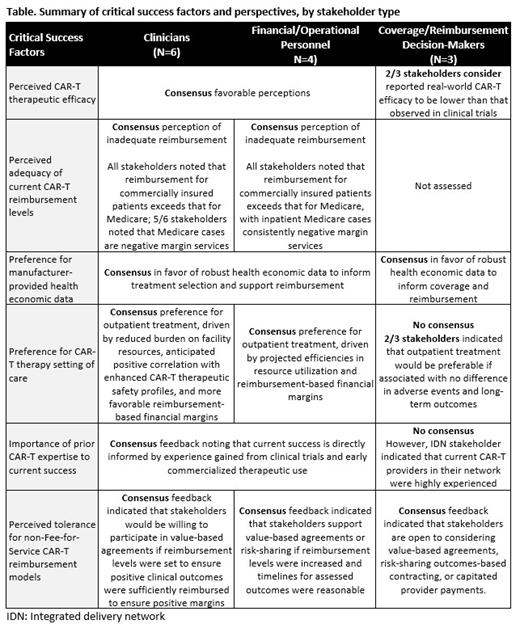Abstract
CAR-T therapies represent a novel advance in oncology, albeit at list prices that exceed $373,000 (and that does not capture their total cost to the healthcare system). Since initial product approval in 2017, stakeholders and observers have attempted to investigate clinical and financial impacts of CAR-T therapies, and potential approaches to optimizing access and use by eligible patients. Most existing research is from a single stakeholder perspective - patients, providers, or payers - limiting the ability to draw broader conclusions on trends and offer prospective recommendations. To address this knowledge gap, we sought to identify and describe critical success factors for optimal delivery of CAR-T therapies. We undertook a qualitative study based on interviews with multiple US-based stakeholders including clinicians, financial and operations staff, and payer-insurers.
Interviewees--which included oncologists (n=6), facility financial and operational personnel (n=4), and coverage and reimbursement decision-makers from US health plans (n=3)--completed structured, live, hour-long, interviews covering clinical, administrative, and general topics on patient access to CAR-T therapies. All clinicians had experience with ≥1 FDA-approved CAR-T therapies in both registered clinical trials and clinical practice; financial and operational personnel were affiliated with the same facilities as the clinicians, and also had real-world experience with these therapies; payer representatives were directors from a large national commercial plan, regional integrated delivery network, and a Medicare administrative contractor, respectively.
Consensus facility feedback (i.e., clinicians, operational personnel) was that CAR-T is effective, and that their administrative processes had been optimized through care team coordination and experience-based efficiencies; in contrast, 2 of 3 payer interviewees expressed that, while CAR-T therapies have shown efficacy, their real-world benefits and applicability are less well-defined. Facility interviewees noted that: (1) reimbursement from commercial insurers is higher than from Medicare, with the latter associated with per-patient net-neutral or negative margins; (2) when possible, differential reimbursement between inpatient and outpatient settings may drive patient management towards outpatient care; and (3) negative-margin cases are currently deemed acceptable due to nonclinical factors (i.e., competitive pressure within a geographic region, anticipated branding/marketing value) and relatively small treated populations. From payer interviewees, CAR-T cost and perceived cost-to-value have made health plans more receptive to considering outcomes-based contracting, capitated provider payments, or other mitigation methods. Left unoptimized, these factors may adversely impact patient access to, and long-term provider attractiveness of, CAR-T therapies.
All interviewees agreed that as the CAR-T marketplace grows, a strong preference exists for manufacturers to develop and communicate for their therapies durable outcomes data, clear and comprehensive reimbursement information, and competitive pricing. With the potential for many approved products in a single indication, and/or a single approval for indications with relatively large eligible patient populations, interviewees also conveyed interest in compelling health economic data. Facility interviewees also acknowledged that if it remains an overall net-negative margin service, new providers will be less able to start CAR-T programs and smaller programs may encounter sustainability issues, collectively jeopardizing patient access to these life-changing therapies.
Overall, findings from this study suggest that during the continued maturation of the landscape, stakeholders will need to be proactive to ensure that CAR T-cell therapies can be maintained amidst financial and operational pressures. Several CAR-T therapy options for multiple myeloma are on the immediate horizon, likely increasing demand among eligible patients. Accordingly, the need to link real-world evidence of the clinical value and institutional investment burden of these therapies to reimbursement is imperative, both to insulate payers and enable clinicians to provide innovative therapies.
Faber: Amgen: Honoraria; Adaptive: Honoraria; Cardinal Health: Honoraria; Celgene: Honoraria; Astra Zeneca: Honoraria; GlaxoSmith Kline: Honoraria; Janssen: Honoraria; Juno: Honoraria; Karyopharm: Honoraria; Kite: Honoraria; Takeda: Honoraria; Sanofi Genzyme: Honoraria. Hunter: BMS: Consultancy, Honoraria; Kite: Consultancy, Honoraria, Speakers Bureau; Novartis: Consultancy, Honoraria. Deol: Kite, a Gilead Company: Consultancy. Crivera: Johnson & Johnson: Current Employment, Current equity holder in publicly-traded company. Riccobono: Legend Biotech: Current Employment, Current holder of individual stocks in a privately-held company, Current holder of stock options in a privately-held company. Garrett: Legend Biotech USA: Current Employment. Jackson: Memorial Sloan Kettering Cancer Center: Consultancy; Janssen: Current Employment. Fowler: Amgen: Ended employment in the past 24 months; Janssen: Current Employment. Berger: Janssen Scientific Affairs: Consultancy, Research Funding. Lorden: Janssen Scientific Affairs: Consultancy, Research Funding. Stewart: Janssen Scientific Affairs: Consultancy, Research Funding.


